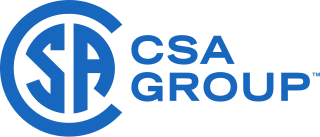Related Research Articles

Safety is the state of being "safe", the condition of being protected from harm or other danger. Safety can also refer to the control of recognized hazards in order to achieve an acceptable level of risk.

A certification mark on a commercial product or service is a registered mark that enables its owner to certify that the goods or services of a particular provider have particular properties, e.g., regional or other origin, material, quality, accuracy, mode of manufacture, being produced by union labor, etc. The standards to which the product is held are stipulated by the owner of the certification mark.

The CSA Group is a standards organization which develops standards in 57 areas. CSA publishes standards in print and electronic form, and provides training and advisory services. CSA is composed of representatives from industry, government, and consumer groups.

Cannabidiol (CBD) is a phytocannabinoid discovered in 1940. It is one of 113 identified cannabinoids in cannabis plants, along with tetrahydrocannabinol (THC), and accounts for up to 40% of the plant's extract. As of 2022, clinical research on CBD included studies related to the treatment of anxiety, addiction, psychosis, movement disorders, and pain, but there is insufficient high-quality evidence that cannabidiol is effective for these conditions. CBD is also sold as a herbal dietary supplement promoted with unproven claims of particular therapeutic effects.
AsureQuality Limited is a State-Owned Enterprise (SOE) fully owned by the government of New Zealand. The company's core business is food quality assurance with its services including certification, inspection, testing, and training. AsureQuality has over 1700 staff at over 100 locations throughout New Zealand. AsureQuality also has a joint venture partner, Bureau Veritas.. Bureau Veritas and AsureQuality have two joint ventures, BVAQ Australia and BVAQ SouthEast Asia.

AOAC International is a 501(c) non-profit scientific association with headquarters in Rockville, Maryland. It was founded in 1884 as the Association of Official Agricultural Chemists (AOAC) and became AOAC International in 1991. It publishes standardized, chemical analysis methods designed to increase confidence in the results of chemical and microbiological analyses. Government agencies and civil organizations often require that laboratories use official AOAC methods. AOAC is headquartered in Rockville, Maryland, and has approximately 3,000 members based in over 90 countries.

THC-O-acetate is the acetate ester of THC. The term THC-O-acetate and its variations are commonly used for two types of the substance, dependent on which cannabinoid it is synthesized from. The difference between Δ8-THC and Δ9-THC is bond placement on the cyclohexene ring.

NSF is a product testing, inspection, certification organization with headquarters in Ann Arbor, Michigan. NSF also offers consulting and training services worldwide.

Steep Hill, INC. is a California-based medical cannabis and adult-use cannabis testing, analytics, and research laboratory that opened in late 2007. It was the first commercial medical cannabis testing lab to open in the United States.

Tetrahydrocannabinolic acid is a precursor of tetrahydrocannabinol (THC), an active component of cannabis.

Cannabis in Iowa is illegal for recreational use if classified as marijuana but consumable hemp products including CBD products are legal for consumers to possess and registered retailers to sell. Possession of even small amounts of marijuana is a misdemeanor crime. The state has a medical program for patients with qualifying debilitating medical conditions that allows for the legal sale and possession of no more than 4.5g of THC per patient every 90-day period. Allowed modes of consumption are oral & topical forms including, but not limited to; tablets and tinctures, nebulizable inhalable forms, suppositories, and vaporization.
Cannabis in Italy is currently legal for medical and industrial uses, although it is strictly regulated, while it is decriminalized for recreational uses. In particular, the possession of small amounts of marijuana for personal use is a civil infraction. The possible sanctions for possession vary from the issuing of a diffida to first offenders, that is an injunction not to use the drug again; to the temporary suspension of certain personal documents for repeat offenders. Conversely, the unauthorized sale of cannabis-related products is illegal and punishable with imprisonment, as is the unlicensed cultivation of cannabis, although recent court cases have effectively established the legality of cultivating small amounts of cannabis for exclusively personal use. The licensed cultivation of cannabis for medical and industrial purposes requires the use of certified seeds; however, there is no need for authorization to plant certified seeds with minimal levels of psychoactive compounds.
The cannabis industry is composed of legal cultivators and producers, consumers, independent industrial standards bodies, ancillary products and services, regulators and researchers concerning cannabis and its industrial derivative, hemp. The cannabis industry has been inhibited by regulatory restrictions for most of recent history, but the legal market has emerged rapidly as more governments legalize medical and adult use. Uruguay became the first country to legalize recreational marijuana through legislation in December, 2013. Canada became the first country to legalize private sales of recreational marijuana with Bill C-45 in 2018.
Cannabis product testing is a form of product testing analyzes the quality of cannabis extracts, edibles, and THC and CBD levels in an emergent consumer market eager to sell adult use products. Analytical chemistry and microbiology laboratories are important entities in consumer protection. These labs not only determine the condition and viability of cannabinoids, water content, heavy metals, pesticides, terpenes, yeast, but also the presence of mold, mycotoxins, and solvents. These laboratories emerged when advocates of cannabis testing raised concerns about potential contaminants.
Women have been active in the cannabis industry, cannabis legalization, cannabis testing, and cannabis rights since the earliest days of commercialization, but they have also faced gendered obstacles impeding their growth in an industry worth over 12 million dollars since 2019. "The American cannabis industry accounted for $10 billion of 2018’s [global] figures, with the average U.S. dispensary pulling in $3 million a year."

A budtender is a title of a staff member who works within a dispensary or store where medical or recreational cannabis is sold. Their job is to offer suggestions to customers, answer questions, handle products and showcase products being sold.
Neptune Wellness Solutions, Inc. is a diversified wellness company that provides nutraceuticals, organic food and beverages, and consumer packaged goods to retail and business customers. Originally known for Antarctic krill oil production, the company previously operated an industrial-scale licensed cannabis processing plant in Quebec, CA, and a hemp processing facility in North Carolina in the U.S. until selling the cannabis business in 2022.
A certificate of analysis (COA) is a formal laboratory-prepared document that details the results of one or more laboratory analyses, signed—manually or electronically—by an authorized representative of the entity conducting the analyses. This document gives assurances to the recipient that the analyzed item is what it is designated to be, or has the features advertised by the producer. The design and content of a COA may be based upon a set of requirements identified by the lab, by regulatory-driven requirements, and/or by standards developed by standard developing organizations. The COA is used in a wide variety of industries, including but not limited to the agriculture, chemical, clinical research, food and beverage, and pharmaceutical industries.

Δ-8-tetrahydrocannabinol is a psychoactive cannabinoid found in the Cannabis plant. It is an isomer of delta-9-tetrahydrocannabinol, the compound commonly known as THC, with which it co-occurs in hemp; natural quantities of ∆8-THC found in hemp are low.
Cannabis irradiation is a process used in the cannabis industry to remove or inactivate microbial contaminants from cannabis meant for human consumption, using various forms of radiation. The radiation applied may include gamma radiation, electron beam irradiation, and X-rays. Cold plasma has also been studied experimentally in Israel. As of 2021, the most common radiation used to decontaminate was gamma rays. In the regulated Canadian market, "irradiation is considered to be an effective way of meeting [microbial contaminants] standards", and it has been "standard practice" since at least 2016 in Canada and the Netherlands.
References
- ↑ Herron-Wheeler, Addison (2021-02-17). "First Women-Owned Cannabis and Hemp CBD Laboratory Gets Certified By WBENC". High Times. Retrieved 2023-12-29.
- ↑ "Green Leaf Labs Certified As Woman-Owned CBD Laboratory". Greenhouse Product News. Retrieved 2023-12-29.
- ↑ "National Hemp Testing Lab | Cannabis Testing Lab Oregon". Green Leaf Lab. Retrieved 2023-12-29.
- 1 2 Rowshan Reordan, on behalf of Green Leaf Lab, Testimony to the Measure 91 Joint Committee, April 13, 2015, https://olis.oregonlegislature.gov/liz/2015R1/Downloads/CommitteeMeetingDocument/62721
- ↑ "Rowshan Reordan | Green Leaf Labs - Women Leading In Cannabis (podcast)". Listen Notes. 2021-06-14. Retrieved 2023-12-29.
- 1 2 Oregonian/OregonLive, Noelle Crombie | The (2017-06-18). "Contaminated marijuana still reaching consumers in Oregon". oregonlive. Retrieved 2023-12-29.
- ↑ Leafly Cannabis Harvest Report 2022 by David Downs and Amelia Williams, with Bruce Barcott and Beau Whitney Contributors: Calvin Stovall and Max Savage Levenson https://leafly-cms-production.imgix.net/wp-content/uploads/2022/11/04104710/Leafly-Crops-Report-2022.11.4corrected.pdf
- ↑ "Weedist Women: Rowshan Reordan of Green Leaf Lab". Weedist. Retrieved 2023-12-29.
- ↑ "CANNALYSIS Trademark of QC LABS - Registration Number 6177528 - Serial Number 88263110 :: Justia Trademarks". trademarks.justia.com. Retrieved 2023-12-29.